
Oliver79
-
Gesamte Inhalte
693 -
Benutzer seit
-
Letzter Besuch
Beiträge von Oliver79
-
-
 Zitat
ZitatTo mark the 30th anniversary of Georges Delerue's passing (1925-2022), this CD release pays tribute to his classical and vocal music, which until now had been largely lacking from his discography.
Delerue’s film music is well known and loved, but his abundant concert music output is also well worth discovering, as shown in this recording.
Sixty singers, two vocal soloists and twenty-two musicians enthusiastically participated in this wild adventure.
The centerpiece of the CD is an oratorio for mixed choir, solo baritone and instrumental ensemble: "Trois Prières pour les Temps de Détresse", premiered in 1983 at the Choralies de Vaison-la-Romaine, had never been recorded until now.
Delerue’s song cycles on poems by Paul Eluard, for baritone and piano, and for soprano and piano, have also been recorded for the first time.
As for his two cantatas for a cappella choir, a previous recording was originally released, but never enjoyed wide distribution.
The final selection on the CD consists of five excerpts from his opera "Le Chevalier de Neige", the fruit of his beautiful collaboration with Boris Vian, premiered in 1957 at the Opéra de Nancy. It is quite a unique testimony, as the original recording has been lost.
Whether tonal, atonal, or polytonal, Georges Delerue’s classical music reveals a refined, radiant lyricism while fully asserting its modernity. An abashedly free and independent spirit throughout his life, Delerue crafted and perfected a deeply personal voice in the music world, leaving us with a rich legacy which encompasses many musical forms and genres.
1 - Dedans Paris - 1956. (1:45)
Texte de Clément Marot, pour Baryton et Piano2 - Tant que mes yeux - 1955. (1:40)
Sonnet de Louise Labé, pour Soprano et Piano3 - Chanson de Fortunio - 1977. (1:50)
Texte d’Alfred de Musset, pour Baryton et Piano4 - Étranges étrangers - 1989. (5:00)
Paroles de Jacques Prévert pour Soprano solo et Choeur5 - Trois mélodies - 1973
Poèmes de Paul Éluard pour Soprano et Piano
Saint Alban (1:50), Un seul corps (2:00), Le baiser (1:20)6 - Vitrail - 1979. (11:00) Pour ensemble de Cuivres
7 - Trois mélodies - 1990. (5:40)
On ne peut me connaître, (0:50)
Tu te lèves l’eau se déplie, (1:50)
Son avidité n’a d’égal que moi. (3:40)
Poèmes de Paul Éluard pour Baryton et Piano8 - En allant avec le fleuve - 1974. (4:00)
Texte de Micheline Gautron - Cantate pour Choeur9 - Le chevalier de neige - 1957.
Complainte de la Reine (Acte I Scène VI), (3:20)
air de Merlin (Acte II Scène IV bis), (2:20)
air de Morgane (Acte III Scène IV bis), (2:10)
air de Lancelot (Acte III Scène VI), (1:00)
Choeur final (Acte III Final) (1:40)
Extrait de l’opéra sur un livret de Boris Vian
Pour Soprano, Baryton, choeur et Ensemble Instrumental10 - Trois Prières pour les Temps de Détresse - 1983. (18:00)
Oratorio pour Baryton, Choeur et Ensemble Instrumental
Créé aux Xlème Choralies de Vaison-la-Romaine-
 1
1
-
-
Neben Banana Joe und der Neuauflage von ...continuavano a chiamarlo Trinita kommen von Beat Records am 10. Dezember noch zwei weitere CDs: Ein Album mit Renato Rascels Scores für die Komödien Commissariato di notturna und La supplente sowie eine erweiterte Fassung von Riz Ortolanis Musik zu dem Eurospy-Streifen Tiffany memorandum.
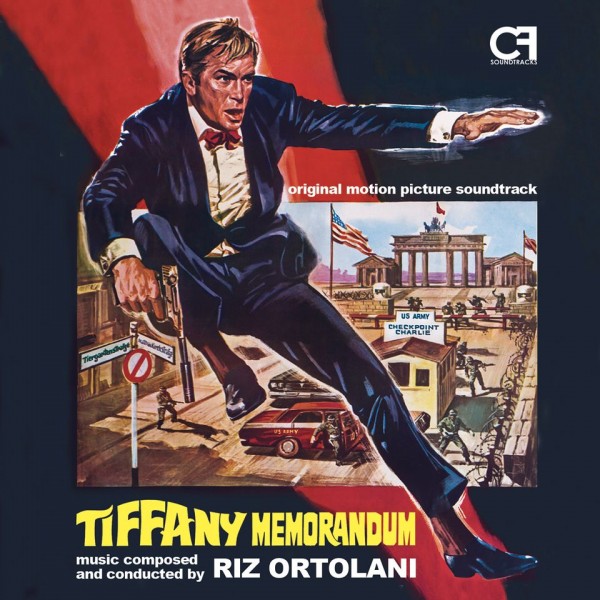 Zitat
ZitatCFS & BEAT pay homage to the Eurospy genre by releasing on CD the complete edition of Riz Ortolani's music for the spy film Tiffany Memorandum, directed in 1967 by Sergio Grieco. As this is the seventh volume of the label, in reference to the film genre this CD of ours has, not by chance, the catalog number CFS007, also in honor of the sixty years of James Bond, Secret Agent 007. For this CD of ours, we were able to use the mono tapes of the original session which allowed us to discover unreleased material, for a total length of 55:11. Riz Ortolani composed a brilliant score based on danceable music (as was in vogue at the time) which we can hear in “Beat fuga shake,” which is frequently reprised throughout the score. This OST features wild "shake" rhythms alternated with suspenseful pieces for electric guitar, winds and percussion. Generally, a secret agent is always in the company of beautiful women, and this glamorous side of a spy is underlined by sensual and refined romantic themes. This CD is dedicated to the musical art of the great Maestro Riz Ortolani and is an essential addition to the collections of those who love the espionage genre, from James Bond, Matt Helm and Derek Flint to all of the Eurospy secret agents.
Mastering and liner notes by Claudio Fuiano, graphic layout by Claudio Fuiano and Daniele De Gemini
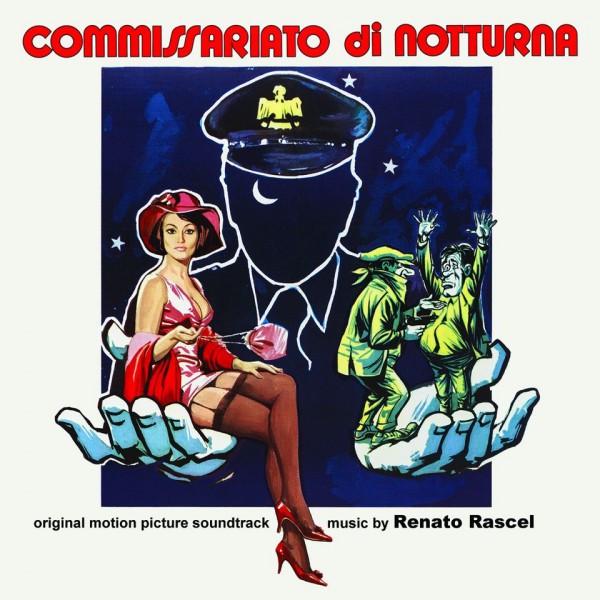 Zitat
ZitatBeat Records is pleased to present on CD on the first absolute time the original soundtracks for COMMISSARIATO DI NOTTURNA, a comedy directed in 1973 by Guido Leoni and starring Gastone Moschin, Rosanna Schiaffino, Maurice Ronet, Luciano Salce, Carlo Giuffré, Giorgio Ardisson, Antonio Casagrande, Emma Danieli, Giacomo Furia, Gisela Hahn and LA SUPPLENTE , an erotic comedy directed by Guido Leoni and starring Carmen Villani, Eligio Zamara, Carlo Giuffré, Dayle Haddon, Alvaro Brunetti, Gisela Hahn, Gastone Pescucci, Giusi Raspani Dandolo, Giacomo Furia. For "Commissariato di notturna" Renato Rascel wrote a score based on a recurring main theme, with a pop flavor, sung by the choir of Nora Orlandi, which returns during the soundtrack in a tango version, with moog, then reprised by the choir. To note the romantic love theme called "Addio sera", in an instrumental version for guitar, piano and orchestra, played both by a female voice and, in the end credits, by Rascel himself. For "La supplente", on the other hand, Renato Rascel has composed a pleasant score with Latin rhythms, which alternates happy moments with other tender and romantic ones, but there is no shortage of suspense pieces and baroque music for choir and rhythms that keep us nailed to listening to a full 74 minutes and 24 seconds. An archival CD dedicated to high quality Film Music.
Mastering by Claudio Fuiano, liner notes by Elisabetta Castiglioni, graphic layout by Daniele De Gemini
-
Tom Howes Musik zu dem Weihnachtspecial Shaun the Sheep: The Flight Before Christmas (2021) gibt es via Rambling Records aus Japan jetzt doch noch als gepresste CD.
ZitatJapanese CD release! Original soundtrack from the latest short film "SHAUN THE SHEEP: THE FLIGHT BEFORE CHRISTMAS". The music for this film was composed by Tom Howe, a British composer whose music for "SA SHAUN THE SHEEP MOVIE: FARMAGEDDON" was also well received.
The Christmas-inspired sounds of slavery bells and choirs, along with sparkling glockenspiels and celestas, make the characters' movements even more charming. And then there's the soulful singing in the opening! -
Und in dieser Woche gibt es von Columbia Japan mit dem Score zu der neuen Animeserie Management of a Novice Alchemist gleich noch einen neuen Titel von Harumi Fuuki.
 Zitat
ZitatOriginal soundtrack from the TV Anime "Shinmai Renkinjutsushi no Tenpo Keiei." Contains its intro/outro theme songs (TV size) and BGM tracks.
-
Digitmovies veröffentlichen am 5. Dezember ein Boxset mit Wiederveröffentlichungen von vier Giallo-Scores von Bruno Nicolai.
 Zitat
ZitatThe four most thrilling and famous soundtracks composed by Maestro Bruno Nicolai re-live in this deluxe edition, after a long time of absence from our catalogue. Like our best sellers “Sodoma and Gomorrah” (aka “Sodoma e Gomorrah”) and “Trinity is still my name” (aka“Continuavano a chiamarlo Trinità”), this reprint comes from many requests of collectors and from our willing to publish these wonderful OSTs once again, with brand new graphics, in a collector’s edition box set enriched with a booklet of 32 pages with movie and music annotations, pictures, posters reproductions and typographic molds of that time. BRUNO NICOLAI Bruno Nicolai was born in Rome on May 26th, 1926. He studied piano at the S. Cecilia conservatory in Rome and the organ at the Papal Institute of Sacred Music. Composer, pianist, organist, orchestra leader and editor, between 1950 and 1964 he worked with S. Cecilia Academy Orchestra and with RAI symphonic orchestra of Rome. During the eighties he teached armony and composition at the public music school in Frosinone and at the Bologna conservatory. The encounter with Cinema happened almost casually, thanks to director Guido Salvini. Starting from 1962 until the eighties, he composed music for Italian, French and German cinema. Among the most important movies: “Crazy World” (aka “Mondo cane n. 2”, G. Jacopetti, 1963); “Run, Man, Run” (aka “Corri, uomo, corri”, S. Sollima, 1968); “99 Women” (aka “99 donne”, J. Franco, 1968), “Marquis de Sade's Justine” (aka “Justine, ovvero le disavventure della virtù”, J. Franco, 1968); “A Full Day's Work” (aka “Una giornata spesa bene”, J.L. Trintignant, 1972). He worked with Ennio Morricone, as compositor and orchestra leader, for the soundtracks of Alberto De Martino’s movies “Operation Kid Brother” (aka “Ok Connery”, 1966); “Dirty Heroes” (aka “Dalle Ardenne all’inferno”, 1967); “Here We Go Again, Eh Providence?” (aka “Ci risiamo, vero, Provvidenza?”, 1973) and Enzo Castellari’s “Cold eyes of fear” (aka “Gli occhi freddi della paura”, 1971). He signed numerous Italian thrillers OSTs, like Sergio Martino’s “All the colors of the dark” (aka “Tutti i colori del buio”, 1972), “The case of the scorpion's tail” (aka “La coda dello scorpione”, 1971) and “Your vice is a locked room and only I have the key” (aka “Il tuo vizio è una stanza chiusa e solo io ne ho la chiave”, 1972). He worked with Fiorenzo Carpi, close friend of his: “Ballo Excelsior” (1967) and “A White Dress for Marialé” (aka “Un bianco vestito per Marialé”, 1972). Thanks to his performing talents, he was asked to lead Carlo Rustichelli, Luis Bacalov and Nino Rota’s soundtracks. He died in Rome, on August 16th, 1991. THE CASE OF THE SCORPION’S TAIL (LA CODA DELLO SCORPIONE) SOUNDTRACK Maestro Bruno Nicolai knew how to put in music the macabre homicides of that event, writing a dissonant music soaked with elements of avant-garde and jazz. The soundtrack is enriched by two romantic yet nostalgic themes, as background of the love story of the protagonists. For this publication we used every take found in the original masters. DIRECTION AND CAST Directed by Sergio Martino in 1971 and starring Anita Strindberg, George Hilton, Alberto De Mendoza, Evelyn Stewart, Luigi Pistilli. PLOT Miss Baumer, widow because of an explosion of the plane on which her husband Kurt was, goes to Athens to collect the insurance money. She receives one million dollars but she gets brutally killed by a mysterious murderer, who steals all the money. The case is followed by an official of the Interpol and a Greek policeman and, later, by Cleo Dupont, young French journalist. The case gets muddled because of a sequence of murders. NOTES Second thriller movie directed by Sergio Martino, after the remarkable “The Strange Vice of Mrs. Wardh” (aka “Lo strano vizio della signora Wardh”) released on February 1971. The director wanted to give the protagonist part to Edwige Fenech, but he had to change his mind, since she was pregnant. The role was given to Swedish actress Anita Strindberg. The movie was filmed in Greece, Italy and England. It was released in Italian theaters on August 16th, 1971. YOUR VICE IS A LOCKED ROOM AND ONLY I HAVE A KEY (IL TUO VIZIO È UNA STANZA CHIUSA E SOLO IO NE HO LA CHIAVE) SOUNDTRACK Maestro Bruno Nicolai wrote a monothematic score based on variations of a nostalgic and romantic classical adagio for strings and harpsichord. All the horrifying aspects of this story are described through a series of drammatic and atonal themes, alternated to the classic adagio. DIRECTION AND CAST Directed by Sergio Martino in 1972 and starring Edwige Fenech, Anita Strindberg, Luigi Pistilli, Ivan Rassimov, Franco Nebbia, Enrica Bonaccorti. PLOT Professor Oliviero Ruevigny, failed writer, erotomaniac and alcoholic, stuck in a marriage come to an end with his hated wife Irene, is suspected of killing one of his young lovers. There are no clues to accuse him, though. After a while, in his villa, a maid gets killed and her body disappears. Floriana arrives to the villa, she’s the young and sassy niece of Oliviero who will take part in a series of depraved and mysterious plots, which could be only solved by a black cat. NOTES Fourth thriller of Martino, with erotic and gothic elements and a finale inspired by Edgar Allan Poe’s “The Black Cat” (aka “Il gatto nero”). Shot in an evocative Italian villa, the movie is a forerunner of one of the most disturbing scenes of Kubrik’s “The shining” with a typewriter as protagonist. The title originates from a phrase on a note in Martino’s “The Strange Vice of Mrs. Wardh” (aka “Lo strano vizio della signora Wardh”) that said: “Now I know that you’re trying to run from me… but your vice is a room locked from the inside and I have the key, just me”. It was released in Italian theaters on August 18th, 1972. ALL THE COLORS OF THE DARK (TUTTI I COLORI DEL BUIO) SOUNDTRACK Bruno Nicolai wrote and directed one of his best soundtracks for thriller genre. The soundtrack is mainly based on orchestral dark passages, sometimes rythmic, sometimes atmospheric, which give a great sense of constant stress. Other than the romatic love theme, the soundtrack includes another very important theme: that for the “Sabba” in coral version and lounge-psychedelic version with Beat arrangements, performed by Alessandroni’s Modern Cantors. It also contains the sitar execution of the great Alessandro Alessandroni. DIRECTION AND CAST Directed by Sergio Martino in 1972 and starring Edwige Fenech, George Hilton, Ivan Rassimov, Julián Ugarte, Susan Scott, Marina Malfatti. PLOT Young Jane Harrison is traumatized by the killing of her mother and the miscarriage of her child, after a car accident. Also, she always has nightmares of a man chasing her with a sharp knife. Jane asks for help to a psychiatrist, doctor Burton. Mary, a mysterious neighbor, pushes her to take part to some black masses of a Satan worshipers, undermining even more the fragil mind of Jane. NOTES Third thriller directed by Sergio Martino. Set in an autumnal and distressing London. The movie stands back from the many movies born from Dario Argento’s success “The Bird with the Crystal Plumage” (aka “L’uccello dalle piume di cristallo”). This time Martino mixes thrilling elements to esoteric ones, typical of Roman Polanski’s cinema. For this movie, the director confirms the duo Fenech/Hilton, made famous by his first thriller “The Strange Vice of Mrs. Wardh” (aka “Lo strano vizio della signora Wardh”). It was released in Italian theaters on February 28th, 1972. THE CASE OF THE BLOODY IRIS (PERCHÉ QUELLE STRANE GOCCE DI SANGUE SUL CORPO DI JENNIFER?) SOUNDTRACK Bruno Nicolai wrote a romantic theme for Jennifer, which is re-taken in various versions during the whole soundtrack. The main theme has dark and dissonant strings passages, which make the listener feel tense and distressed. DIRECTION AND CAST Directed by Giuliano Carmineo in 1972 and starring Edwige Fenech, George Hilton, Paola Quattrini, Giampiero Albertini, Oreste Lionello, Annabella Incontrera. PLOT Jennifer e Marylin are two models living in an apartment located in a big building. Jennifer is trying to get her life back after having divorced from a violent man who used to force her to have group sex and to take drugs. She meets Andrea and begins an affair with him. Meanwhile, a young prostitute and a stripper get killed in the building. Suspects fall on the residents that knew the victims. The hunt for the killer gets harder due to the largeness of the building. NOTES Operating in the spaghetti-western genre, Giuliano Carmineo takes on thriller genre with “The case of the bloody iris” (aka “Perché quelle strane gocce di sangue sul corpo di Jennifer?”), directed under the pseudonym Anthony Ascott. The movie was entirely shot in Italy, in Rome and Genoa, with the “Martiniana” couple Fenech/Hilton. Carmineo’s movie alternates Argento-ish thrilling moments and Lenzi-ish erotic elements. It was released in Italian theaters on August 10th, 1972.
-
Wurde die CD gecancelt... der Titel ist von der Homepage von Quartet verschwunden.
-
Auf CD und LP von Mondo Music:
 Zitat
ZitatThe Don't Worry Darling (Score from the Original Motion Picture Soundtrack) showcases all new music from Academy Award- and three-time Grammy Award-nominated composer John Powell (“Happy Feet,” “How To Train Your Dragon,” “Solo: A Star Wars Story”). When it came to composing the score, Powell first viewed the assemblage without any sound, only the dialogue. Director Olivia Wilde remembers, “Then he said to me, ‘This movie is more romantic than you are letting it be. Let the score be something that sweeps our hearts away.’ He said that if we played with something more romantic, and used percussion to feel like a heartbeat… by bringing in the world of the orchestra he made it much more emotionally impactful. This was my first experience being able to be with a composer conducting the orchestra, creating the score. I was overwhelmed with that moment, like a kid in a candy store.”
The perfect counterpoint to the sunny and lovestuck soundtrack album, the score properly presents the reality of the film's protagonist. Composer John Powell creates some truly disorienting horrifying soundscapes to underscore the psychological terror of Alice (Florence Pugh) and her journey of discovery in the world of the Victory project.
Featuring artwork by Jack Hughes, and featuring liner notes by composer John Powell and pressed on 2x 140g Eggshell White vinyl (also available on Black Vinyl and on CD)
-
Anlässlich des 75. Jubiläums des polnischen Studios für Animationsfilm haben GAD Records gleich vier Alben mit Musik aus dessen Produktionen veröffentlicht:
Bolek i Lolek na Dzikim Zachodzie - Marek Wilczynski & Andrzej Korzynski
 Zitat
ZitatIn 1986, Bolek and Lolek set out to conquer the Wild West with a full-length feature. The film, based on the 1972 TV series, was very different from the original. Even with brand new music. Absolutely unique.
Marek Wilczyński, a composer who has been collaborating with the Animated Film Studio since the mid-1970s, is a separate artist. Phenomenon. Ones that would be difficult to compare with any other composer in Poland or abroad. He played in Krakow's Zdrój Jana, studied musicology at the Jagiellonian University and explored the secrets of electronic music under the watchful eye of Józef Patkowski, the founder of the Polish Radio Experimental Studio. At the same time, he took part in jazz workshops in Chodzież and dazzled his imagination in illustrating animated films. The music for "Bolek and Lolek in the Wild West" is a surprising marriage of various influences. On the one hand, the country style is present here almost all the time, although it is broken in various ways - with synthesizer interventions and playing with tape speeds, and with references to flamenco. The composer skilfully combined the sounds of analog Moog or Korg instruments with the live sounds of percussion and guitars. In this way, he created intriguing, interesting textures, which can be heard e.g. in the dreamy "Little Town I", the melancholy "Return of the Sheriff" and the majestic "Prairie".
Marek Wilczyński's original music was complemented by several songs written by Andrzej Korzyński and arranged in a style halfway between "Akademia Pana Kleks" and Frank Kimono. Some of them were sung by Piotr Fronczewski (who plays the villain Jimmy Pif-Paf in the film).
All recordings from the film "Bolek and Lolek in the Wild West" have been remastered from the original tapes from the sound archive of the Cartoon Film Studio. The booklet contains a text about the film and its creators, as well as frames from individual episodes. The release is part of a whole series of CDs prepared by Studio Filmów Rysunkowych and GAD Records on the occasion of the Studio's 75th anniversary.
Pampalini łowca zwierząt - Antoni Mleczko
 Zitat
ZitatPampalini. Officially, an animal hunter. Unofficially - the worst, but also the funniest animal hunter in history. The hero of thirteen animated films that still entertain generations to this day. His adventures draw you in thanks to a story full of humor, excellent animation, but also memorable music by Antoni Mleczka.
A charming series of films, invented by Bronisław Zeman and produced by the Animated Film Studio in Bielsko-Biała in the years 1975-80, still entertains and laughs today. But it also surprises with a complex and colorful musical layer, prepared by the Krakow composer, Antoni Mleczka. On the one hand, his music can be extremely fun, free and full of joyful themes, reminiscent of the achievements of Herb Alpert and Tijuana Brass, or Sergio Mendes, or referring to oriental or even country music. On the other hand, it still surprises with its arrangements: live percussion is complemented by a drum machine, Hammond organ introduces a jazz mood, and the combination of vibraphone and acoustic guitar sounds like the late achievements of the Gong band. The whole makes up an extremely colorful whole, going far beyond the purely utilitarian role of illustrative music. In 1988, the montage film “Oh! Pampalini!!!", in which connectors were added to the original episodes. On this occasion, Antoni Mleczko prepared two successful, subtle and (again!) themes bordering on Latin rhythms. Everything was sung - in one take, instantly and perfectly, as always - by Andrzej Zaucha.
All preserved recordings from the TV series "Pampalini the Animal Hunter" and songs from "Oh! Pampaline!!!” were remastered from the original tapes from the Cartoon Film Studio sound archive. The booklet contains text about the series and music as well as stills from individual episodes. The release is part of a whole series of CDs prepared by Studio Filmów Rysunkowych and GAD Records on the occasion of the Studio's 75th anniversary.
Mini - Polish Animated Shorts - Komeda, Kawka, Parzynski, Kocyba
 Zitat
ZitatAiry vocals. Crazy races of trumpets and saxophones. Hypnotic rhythms. In other words: jazz musicians began illustrating animated films in the second half of the 1960s. This unique, little-known and thrilling fragment of the history of the Animated Film Studio in Bielsko-Biała has now been documented on CD.
In the 1960s, the Animated Film Studio not only produced series for children, but was also very active in the field of artistic animation, aimed mainly at adults. At that time, the company collaborated with Mirosław Kijowicz or Bronisław Zeman, starting his long-term adventure with Bielsko. Renowned composers and performers, also from the world of jazz, were invited to create individual productions. "mini. Polish Animated Shorts 1966-69” collects these jazz adventures in the world of animation. The program of the album includes Krzysztof Komeda's iconic music for "Ronda" by Mirosław Kijowicz (for the first time in the full version, as music alone, without sound effects) and previously unreleased soundtracks by Adam Sławiński, Tadeusz Kocyba and members of Novi Singers - Bernard Kawka and Waldemar Parzynski (recorded with the participation of their parent band). It is an extremely colorful journey into the world of syncopated rhythms, interesting arrangements and atmospheric solo parts.
All the recordings have been remastered from the original tapes from the sound archive of the Cartoon Film Studio. The booklet contains an extensive text by Andrzej Winiszewski and stills from films. The release is part of a whole series of CDs prepared by Studio Filmów Rysunkowych and GAD Records on the occasion of the Studio's 75th anniversary.
The Best Of Studio Filmów Rysunkowych - various artists
 Zitat
ZitatThe essence of childhood for many generations and much more. The most famous themes from the headlines of cartoons ("Bolek and Lolek", "Reksio", "Kidnapping Baltazar Gąbka"), but also less known motifs from individual animations - both those for children ("Kuba, Jakub's friend") and adults ("Rondo", "Mini"). Orchestras, jazz, electronics and the obligatory stamp made by Reksio.
Cartoon Film Studio was established in 1947. For decades, they were co-created by, among others, Lechosław Marszałek, Władysław Nehrebecki, Leszek Lorek, Alfred Ledwig and Bronisław Zeman, making both extremely popular series of films for children, as well as original, artistic projects, also aimed at an adult viewer. Formal courage and extraordinary ingenuity also translated into music composed for individual productions. The 41 tracks selected for the album "The Best Of..." are just a small part of the Studio's rich sound history - from the oldest surviving theme by Tadeusz Kański from 1957 ("About a bird that did not want to sing") to music written by composers invited from outside (including (e.g. Krzysztof Komeda, Waldemar Parzyński, Andrzej Korzyński or Jan Kanty Pawluśkiewicz).
All the recordings have been remastered from the original tapes from the sound archive of the Cartoon Film Studio. In the booklet, apart from full discographic information and frames from fairy tales, there is a text by Grzegorz Brzozowicz. The release is part of a whole series of CDs prepared by Studio Filmów Rysunkowych and GAD Records on the occasion of the Studio's 75th anniversary.
-
Das ist durchaus hübsch, allerdings habe ich noch nicht die Beispiel in deinem Thread hineingehört, kann das alles so nicht einordnen. Aber wenn man das mit dem doch zumeist öden Gedudel aktueller amerikanischer TV-Serien vergleicht...
-
Vielleicht für Jürgen von Interesse: Columbia Japan haben ein Album mit Harumi Fuukis Musik für die TV-Serie Maiagare! veröffentlicht.
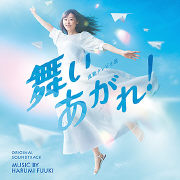 Zitat
ZitatMAIAGARE! NHK Renzoku TV Shosetsu in 2022 is an original work set in the manufacturing town of Higashi-Osaka and the nature-rich Goto Islands in Nagasaki, depicting the heroine Mai Iwakura (Haruka Fukuhara), who never gives up looking up at the sky and flying, despite being tossed about by various difficulties.
Harumi Fuuki who composed music for this TV drama, actually traveled to the Goto Islands to weave a heartwarming melody with sounds inspired by airplanes and the Goto Islands. The main theme as well as the emotional songs that accompany the characters are also worth listening to. Please enjoy the musical world of MAIAGARE!.
-
 1
1
-
-
Kadowaka neues 4K-HD-Set des japanischen Thrillers The Beast to Die (1980) enthält als Bonus eine CD mit dem Score von Akihiko Takashima.
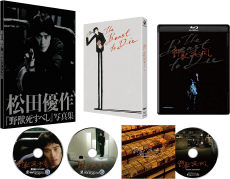 Zitat
ZitatA set of a 4K UltraHD Blu-ray and Blu-ray for the film "YAJU SHISUBESHI (THE BEAST TO DIE)." Comes with a photo book (A4 soft cover/100 pages) and an original soundtrack CD. The world premiere CD release of the remastered 6mm theatrical soundtrack of this film!
Special Feature: TV spots, promotional clips, "ME (Music & Effect) Audio" (24bit/96kHz), audio commentary
-
Howlin' Wolf Records haben auch in diesem Jahr wieder einen Score zu einem weihnachtlichen Horrorfilm veröffentlicht: Deathcember mit Beiträgen von Andrew Scott Bell und einer Horde weiterer Komponisten, welche die Musik zu den einzelnen Episoden dieses Anthologiefilms beisteuerten.
 Zitat
ZitatHowlin' Wolf Records is excited to present DEATHCEMBER, a holiday-themed horror anthology series soundtrack, with an international ensemble of renowned composers, directors, and actors. Produced by Dominic Saxl, Ivo Scheloske, and Frank Vogt, DEATHCEMBER brings to life a feature-length advent calendar - each door a portal to terror and demented holiday fun! So, will you dare to open the door?
The DEATHCEMBER "Main Theme" and "Suite" are composed by award-winning composer Andrew Scott Bell, performed by the Budapest Scoring Orchestra with Péter Illényi conducting, featuring oboe soloist Judit Borzsonyi, and clarinet soloist Gyorgy Ree. The melodic and sweeping opening theme adds the perfect sense of enchantment and wonder for the advent season. In addition, Andrew Scott Bell composes the transition suites that wind through the score like a snake in the guise of holiday ribbon. Segment scores are a brilliant mix of amazing international talent from Belgium, Canada, Germany, Serbia, UK, and USA. among others, showcasing the talents of composers Andrew Scott Bell, Stephan Nicolas, Nemanja Mosurovic, Jeffrey Peter Mayhew, The NightStalker, Michael Kaufmann, Eduardo Daniel Victoria, Steffen Britzke, Dag Lerner, Nikola Nikita Jeremic, Medhat Hanbali, Erik Lutz, Peter Litvin, Dirk Steffan Buro, and Michael Kohlbecker.
The DEATHCEMBER soundtrack comes with a 32-page booklet including a foreword by producers Dominic Saxl, Ivo Scheloske, and Frank Vogt along with a note from segment director Sam Wineman about his friend and collaborator, Andrew Scott Bell. In addition, the booklet features notes by composers Stephan Nicolas, Jeffrey Peter Mayhew, Michael Kaufmann, Eduardo Daniel Victoria, Nikola Nikita Jeremic, Medhat Hanbali, and Dirk Steffan Buro, all beautifully packaged in a jewel case with exquisite artwork by Adrian Keindorf (booklet cover), Flavio Greco Paglia (booklet back), and art direction and designs by the magnificent Luis Miguel Rojas.
-
Bei Plaza Mayor Company Ltd ist eine CD mit Raf Keunens Musik für den italienischen Horrorfilm Flowing aka Piovre auf CD und digital erschienen.
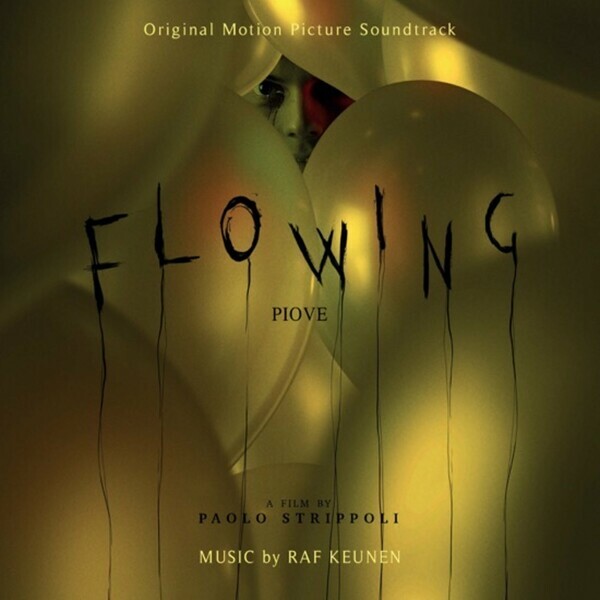
-
Bei Soundtrack Pub erscheint am 23.11. ein Doppelalbum mit Yusuke Hommas Kompositionen für die japanischen Kiddie-Shows Omoikkiri Tanteidan Hakurakugumi und Jaman Tanteidan Makonigumi.
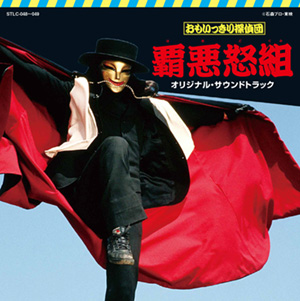 Zitat
ZitatThe first soundtrack album that contains the music (BGM) from the TV drama "Toei Fushigi Comedy Series" for children broadcasted in the 80's and 90's!
The theme song and music (BGM) of the 1987 broadcast "Omoikkiri Tanteidan Hakunugumi" and the 1988 broadcast "Jaman Tanteidan Maringumi" were compiled into two CDs.The music is in charge of Yusuke Homma, who works on the popular drama "Ninzaburo Furuhata" and the anime "Fushigi Yugi". A variety of music supported a variety of episodes, such as the mysterious songs that flowed in the appearance scenes of Kaijin Matenro and Kaito Jigoma, light songs and humorous songs that liven up the activities of the detective group.
This album contains the BGM created for both works (all songs except for some unused takes and extra songs). The newly recorded version of "Shino's Counting Song" used in the 25th episode of "Omoikkiri Tanteidan Haakudougumi" and the "Princess Tanuki Theme" used in the 44th episode were recorded separately from the regular music. Extra music was recorded as much as possible. Includes TV size and record size of the opening and ending theme songs!
*Because we are using an old sound source, there are parts that are difficult to listen to, but please understand.
-
Hatte ich mich auch gewundert, was es mit diesem Stück eigentlich auf sich hat. Ich dachte immer, dass wäre vielleicht ein Stück Source Music aus dem Film, das ich vielleicht nicht mehr in Erinnerung hatte.
-
 Zitat
ZitatMusic Box Records is pleased to present, for the first time on CD, an album dedicated to French composer Philippe Miller and a selection of his best works composed for the screen (Cinema and television) between 1997 and 2016.
Born in Paris in 1962, Philippe Miller is a musician and a self-taught composer. He composes scores for film, television and theatrical productions. He also teaches at the Conservatory of Gennevilliers. With a background in classical piano studies and music theory, Miller was introduced to orchestration through rehearsals with the Orchestre de Paris. Miller’s first composition for stage was for Génération Chaos (1991), a play written and directed by Marc’O. Nominated at the César awards in 1998, the musical drama film Jeanne et le Garcon Formidable (Jeanne and the Perfect Guy, 1998) marked the debut of his first soundtrack for a feature-length movie.
This compilation shows the talent of Philippe Miller as a film music composer and highlights his two main collaborations with Hélène Angel (Peau d'homme cœur de bête, Rencontre avec le dragon, Propriété interdite and Primaire) and duo of directors Olivier Ducastel and Jacques Martineau (Jeanne et le Garçon formidable and Nés en 68). The CD is a limited editon of 300 units.
-
 Zitat
ZitatWorld Premiere CD Release. Remastered edition.
8-page CD booklet with French and English liner notes by Nicolas Magenham.In collaboration with Warner Music France, Music Box Records proudly presents the premiere CD release of the original 1973 LP album dedicated to Michel Magne and his best film music themes recorded at Ferber Studios in 1973: Michel Magne et son Grand Orchestre jouent les musiques de films de Michel Magne.
Four years after the fire that destroyed a large part of the composer’s works in the Château d'Hérouville, Michel Magne, with the precious help of arrangers Bernard Gérard, Claude Germain and Raymond Alessandrini, reworked some of his biggest successes, fully rearranged for this compilation. Between historical romance film (Angélique, Marquise des Anges), the French thriller (Mélodie en sous-sol), the hedonistic films of Roger Vadim (Le Repos du guerrier, La Ronde and Don Juan 73) and one of the most sulphurous feature films by Luis Buñuel (Belle de jour), this album highlights the great successes of Michel Magne during the 1960s and 1970s with new top notch arrangements.
The CD has been remastered from pristine condition stereo master tape vaulted by Warner Music France. This present edition comes with an 8-page booklet with liner notes by Nicolas Magenham. The release is limited to 500 units.
-
Music Box haben das Doppelalbum noch einmal neu aufgelegt.
 Zitat
ZitatNewly remastered edition. 2-CD set.
More than 2 hours of music, including 30 minutes of previously unreleased music.
A full-color 12-page CD booklet with French and English liner notes by Sylvain Pfeffer.In collaboration with TF1 Studio, Music Box Records presents the CD reissue of the epic Georges Delerue score La Révolution française (The French Revolution, 1989).
Shown in two parts upon its original release (The Light Years and The Terrible Years), the two-part film by Robert Enrico and Richard T. Heffron was made for the 200th anniversary of the Revolution and detailed the history of the conflict in six hours with an international cast such as Jean-François Balmer, Jane Seymour, Andrzej Seweryn, Klaus Maria Brandauer, Sam Neill, Claudia Cardinale, Peter Ustinov, François Cluzet and Christopher Lee. The film spans one of the longest and most complex scores by Georges Delerue. The colorful tapestry of the 20+ year history allowed the composer to create one of his most evocative scores ranging from his best-known romantic side to lush period pieces, choral majesty and disturbing strings suspense for the fall of Robespierre and friends. The epic score was recorded at CBS Studios in London with the British Symphony Orchestra.
In 2014, Music Box Records released the expanded soundtrack in a deluxe limited 25th anniversary collector's edition, including the full program of the original Polydor albums with over 35 minutes of previously unreleased music from the composer's archives. This newly remastered release contains the same music as the previous edition but with improved sound quality. The French Revolution can be considered as one of Georges Delerue's great achievements in his whole career.
The CD comes with a 12-page booklet with new liner notes by Sylvain Pfeffer, discussing the film and the score. The reissue is limited to 500 units.
-
Bei Alpha Classics ist eine CD mit Guillaume Roussels Musik für das französische Drama Couleurs de l'incendie erschienen.
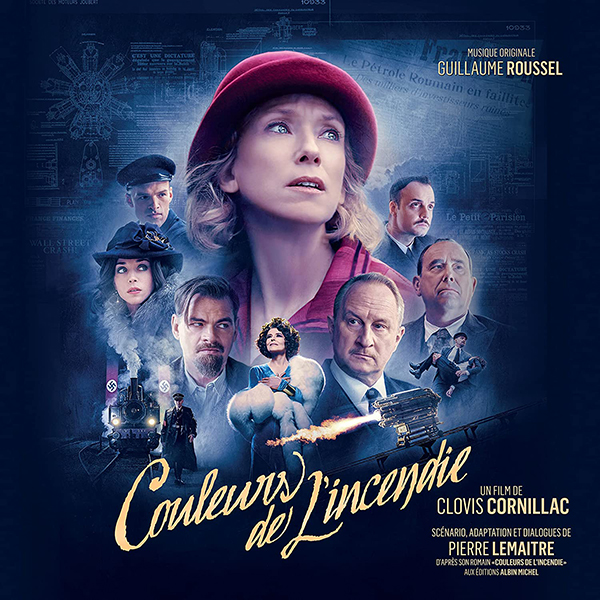
-
Neben dem bereits in einem anderen Thread erwähnten Reissue des Hill/Spencer-Titels von De Angelis, bringen Beat Records am 10. November auch eine Neuauflage von Ennio Morricones Scores für die beiden Provvidenza-Filme (der zweite Teil co-komponiert mit Bruno Nicolai).
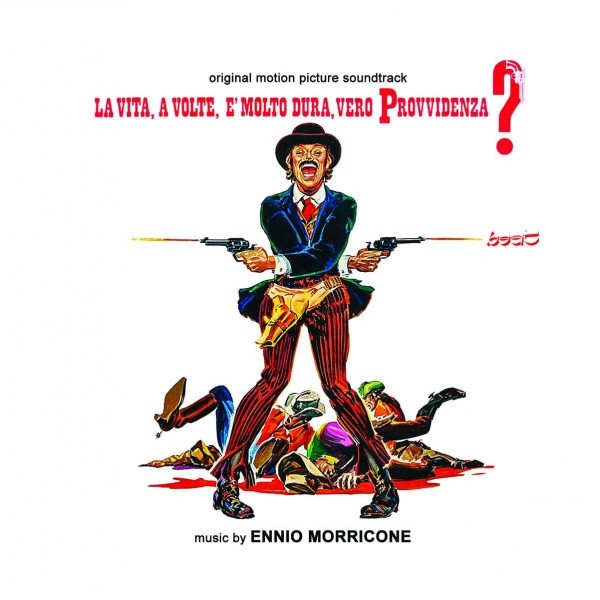 Zitat
ZitatBeat Records is glad to propose again on CD the brilliant music by Ennio Morricone for LA VITA, A VOLTE, È MOLTO DURA, VERO PROVVIDENZA? directed in 1972 by Giulio Petroni and by Ennio Morricone and Bruno Nicolai for CI RISIAMO, VERO PROVVIDENZA? directed in 1973 by Alberto De Martino, two comic westerns starring the legendary Tomas Milian.
For Provvidenza's first adventure, Ennio Morricone composed a cheerful and brilliant score in which a recurring piece of religious/folk flavor emerges for female choir, with pop rhythms and tubular bells. A truly varied OST with suspense music, saloon pieces for piano, a romantic orchestral love theme, Indian music with sitar and a piece that winks at Rossini's Figaro. For the sequel, the varied soundtrack bears the signature of both Ennio Morricone and Bruno Nicolai (who'd previously worked with director De Martino on the films ''Dalle Ardenne all'inferno," ''OK Connery," ''Roma come Chicago'' and ''L'anticristo''). The prestigious duo composed a comic main theme with pop rhythms and choir alternating with square dance music, the delicate love theme ''Bocca a bocca'', saloon pieces, baroque pop music, Asian atmospheres and a great orchestral Can-Can. This long-running CD (76:45), derived from the stereo masters of the original sessions, will transport the listener to the torrid lands of the West in the company of Provvidenza, the funny, kind-hearted character who mocks Charlot with pleasant background music by Ennio Morricone and Bruno Nicolai.
-
Seit Freitag bei Quartet Records erhältlich.
 Zitat
ZitatQuartet Records, in collaboration with Atresmedia Music, present the new score composed by Fernando Velázquez (A MONSTER CALLS, PATRIA, SAVAGE GRACE, THE IMPOSSIBLE, ALMA) for the Spanish thriller-drama directed by Oriol Paulo, based on the best-seller novel written by Torcuato Luna de Tena.
The film is about detective Alicia Gould, investigating the murder of a client’s father, decides to go undercover to an asylum. This is the fourth collaboration between Fernando Velázquez and Oriol Paulo after CONTRATIEMPO, DESPUÉS DE LA TORMENTA and the TV series THE INNOCENT.
Velázquez provides an intense, exciting and highly vigorous score with thick orchestral colors—lyrical, dark and rhythmic, including a haunting main theme and echoes of Bernard Herrmann. The music is sensitively performed by the Orquesta Sinfónica de Navarra under the baton of the composer.
-
Von Milan Records kommt eine CD von Anne-Sophie Versnaeyens Musik zu Nicolas Bedos' Gaunerkomödie Mascarade mit Pierre Niney, Isabelle Adjani, Francois Cluzet und Marina Vacth in den Hauptrollen.
 Zitat
ZitatPrésentée à Cannes, la nouvelle comédie dramatique de Nicolas Bedos "Mascarade" réunit un casting prestigieux : Pierre Niney, Isabelle Adjani ou encore François Cluzet. Pour la musique de ce film, Nicolas Bedos s’est une fois de plus tourné vers Anne-Sophie Versnaeyen, après le succès public et critique de "La Belle Epoque" (2019) ainsi que du dernier "OSS 117 : Alerte rouge en Afrique noire" (2021). La talentueuse compositrice nous offre une sublime partition subtile où le romantisme se fait l'echo de thèmes plus sombres.
Connue pour ses sublimes morceaux en piano, Anne-Sophie Versnaeyen a souhaité s’entourer cette fois-ci de la violoniste soliste Sarah Nemtanu, du violoncelliste Gregoire Korniluk et du pianiste Julien Carton pour composer cette sensationnelle Bande Originale.
On y retrouve de magnifiques valses, des ballades émouvantes ainsi que des morceaux ou se répondent piano et violoncelle qui accompagnent avec perfection le quatrième long métrage de Nicolas Bedos.
Une musique poignante, sentimentale, touchante mais aussi entraînante qui n’est pas sans rappeler la BO de Jóhann Jóhannsson « The Theory of everything »
-
Und viel besser scheint es im angesagten LP-Sektor ja auch nicht zu sein. Jonny Trunk von Trunk Records hat in einem Interview erzählt, dass er bisweilen auch gut 1 Jahr warten muss, bis er einen Titel aus dem Presswerk bekommt.
-
Das chinesische Label Jiaoliu veröffentlicht am 14. November Ryuichi Sakamotos Musik für Ann Huis Drama Love After Love (2020) auf CD und LP.
 Zitat
ZitatMarvellous Japanese composer Ryuichi Sakamoto presents his first ever soundtrack for a Chinese film with 'Love After Love'. He provides a typically atmospheric score for a film which concerns a young girl getting mixed up in a tangled web of power and deceit. It has already been awarded Best Original Film Score at the Hong Kong Film Awards and now comes out physically.
-
 1
1
-

Kurz & knapp: Sammelthread für "kleine" Veröffentlichungen
in Scores & Veröffentlichungen
Geschrieben
Soundtrack Pub veröffentlichen am 21. Dezember ein Doppelalbum mit Katsuhisa Hattoris Musik für die Anime-Serie The Adventures of Tom Sawyer (1980).